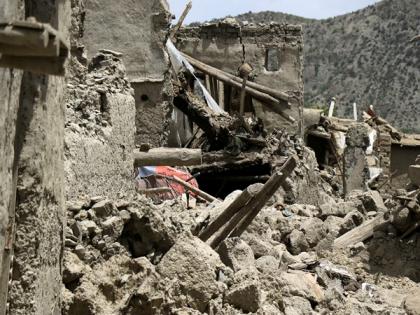Earthquake of magnitude 4.9 strikes Afghanistan
By ANI | Updated: August 17, 2025 00:20 IST2025-08-17T00:14:54+5:302025-08-17T00:20:03+5:30
Kabul [Afghanistan], August 17 : An earthquake of magnitude 4.9 rocked Afghanistan late on Saturday night, the National Center ...

Earthquake of magnitude 4.9 strikes Afghanistan
Kabul [Afghanistan], August 17 : An earthquake of magnitude 4.9 rocked Afghanistan late on Saturday night, the National Center for Seismology (NCS) said in a statement.
As per the NCS, the earthquake took place at a shallow depth of 10km, making it susceptible to aftershocks.
In a post on X, the NCS said, "EQ of M: 4.9, On: 16/08/2025 23:05:03 IST, Lat: 36.83 N, Long: 71.01 E, Depth: 10 Km, Location: Afghanistan."
https://x.com/NCS_Earthquake/status/1956774604703494161
Earlier on August 13, another earthquake of magnitude 4.2 struck the region at a depth of 10km.
In a post on X, the NCS said, "EQ of M: 4.2, On: 13/08/2025 13:53:54 IST, Lat: 35.66 N, Long: 69.12 E, Depth: 10 Km, Location: Afghanistan."
https://x.com/NCS_Earthquake/status/1955549479530115124
Earlier on August 8, an earthquake of magnitude 4.3 struck the region at a depth of 10km.
In a post on X, the NCS said, "EQ of M: 4.3, On: 08/08/2025 01:45:15 IST, Lat: 31.58 N, Long: 67.19 E, Depth: 10 Km, Location: Afghanistan."
https://x.com/NCS_Earthquake/status/1953554978032992586
Shallow earthquakes are generally more dangerous than deep earthquakes. This is because the seismic waves from shallow earthquakes have a shorter distance to travel to the surface, resulting in stronger ground shaking and potentially more damage to structures and greater casualties.
The United Nations Office for the Coordination of Humanitarian Affairs (UNOCHA), Afghanistan, noted that the country remains highly vulnerable to natural disasters, including seasonal flooding, landslides and earthquakes.
These frequent earthquakes in Afghanistan cause damage to vulnerable communities, which are already grappling with decades of conflict and under-development and have left them with little resilience to cope with multiple simultaneous shocks, UNOCHA noted.
Afghanistan has a history of powerful earthquakes, and the Hindu Kush Mountain range is a geologically active area where quakes occur every year, according to the Red Cross.
Afghanistan sits on numerous fault lines between the Indian and the Eurasian tectonic plates, with a fault line also running directly through Herat.
Disclaimer: This post has been auto-published from an agency feed without any modifications to the text and has not been reviewed by an editor
Open in app